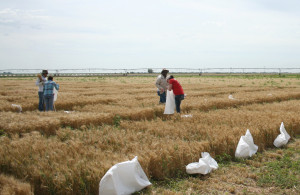By Kay Ledbetter
AgriLife Research study develops international collaboration to fight drought
Texas-bred wheat, by way of Amarillo and College Station, will find tiny bits of itself in new breeds of spring wheat in Africa in the near future.

The Texas A&M AgriLife Research wheat genetics crew gathered biomass samples from the 2014 research plots west of Amarillo. (Texas A&M AgriLife Research photo by Dr. Shuyu Liu)
Dr. Shuyu Liu, Dr. Amir Ibrahim, Dr. Jackie Rudd and Dr. Qingwu Xue – all Texas A&M AgriLife Research wheat program leaders – have been working to strengthen wheat varieties and increase yields and drought tolerance for the Texas industry.
But it is a Texas A&M University doctoral student they advise, Silvano Ocheya, who is taking their work and carrying it across continents in his thesis project.
Ocheya, a Monsanto Beachell-Borlaug Scholar who grew up in Kenya near Kisumu, addresses his work in the thesis, “Identifying Single Nucleotide Polymorphic (SNP) Markers for Drought Tolerance in Texas Wheat and Introgression into Spring Wheat for African Countries.”
“I believe this research is vital and will link research in the U.S. and Kenya,” Ocheya said. “I hope it will create a scientific community between developed and developing countries, and this will enhance germplasm flow as well as information between the two countries.”
Ocheya has been named a Fellow for the Norman E. Borlaug Leadership Enhancement in Agriculture Program of the U.S. Feed the Future Borlaug 21st Century Leadership Initiative and is provided U.S. Agency for International Development funding to cover travel expenses for his research in Kenya, said Liu, an AgriLife Research small grains geneticist in Amarillo.
“This study should add to the foundation required in tackling drought stress across the world,” Liu said. “The SNPs associated with drought tolerance will be used in the marker-assisted breeding to move superior traits from Texas A&M AgriLife TAM wheat into Kenyan spring wheats.”
In addition to Ocheya’s U.S. advisors, Ocheya is working with Dr. Peter Njau at the Kenya Agricultural Research Institute, or KARI, and Dr. Sridhar Bhavani at the International Maize and Wheat Improvement Center in Mexico, more commonly referred to as CIMMYT.
Ibrahim, an AgriLife Research wheat breeder in College Station, said the partnership between the researchers in the U.S., CIMMYT and KARI will be valuable and provides expansion of testing sites and technology sharing.
“This study will provide a platform for knowledge sharing through a student exchange program where students from developing countries can visit schools in the U.S. and learn the experience of plant breeding in a developed country,” Ibrahim said.
Rudd, an AgriLife Research wheat breeder in Amarillo, said this is a truly collaborative project.
“The Kenya wheat program will gain drought tolerance traits from our Texas wheat and we will gain new sources of rust resistance from the African wheat.”
Ocheya said the development of improved wheat varieties with high yield and resilience to drought stress is much needed due to volatile climatic changes, scarce water resources and competing needs for water for urbanization and/or industrialization and rapid population increase, particularly in developing countries.
“We are taking a molecular breeding approach to tag important traits regulating drought tolerance in a known drought-tolerant winter wheat developed and released by Texas A&M AgriLife Research,” he said. “The ultimate goal is to increase yield of spring wheat by introducing these traits into durable stem rust-resistant cultivars from Kenya using marker-assisted selection.”
The research is being conducted at KARI/CIMMYT research farms in Kenya and AgriLife Research farms in Amarillo and College Station. The marker-assisted breeding process will be conducted at the Amarillo center.
“We have made a backcross between durable stem rust-resistant Kenyan lines and TAM winter wheat possessing excellent drought tolerance,” Liu said. “The objective is to introduce drought tolerance into the spring wheat cultivars possessing resistance to stem rust. The backcross seed were harvested mid-May this year and seeds will be prepared for planting in Kenya.”
The field testing will be conducted in multiple target environments in Kenya. The planting season in Kenya is in January and note-taking for the target traits will be done in April and May. Ocheya said the results will be relevant to the U.S. and Kenya, as well as other countries across the world where wheat is grown.
Greenhouse and field trials will run concurrently, he said. The greenhouse experiment is being conducted under artificial inoculation with stem rust strains and data will be captured on disease reaction as well as yield and other agronomic traits.
“The AgriLife Research wheat team is looking forward to the results from this international collaboration and hope our research effort can help wheat production in many African countries,” Liu said.